英语培训资料
- 格式:doc
- 大小:22.50 KB
- 文档页数:7
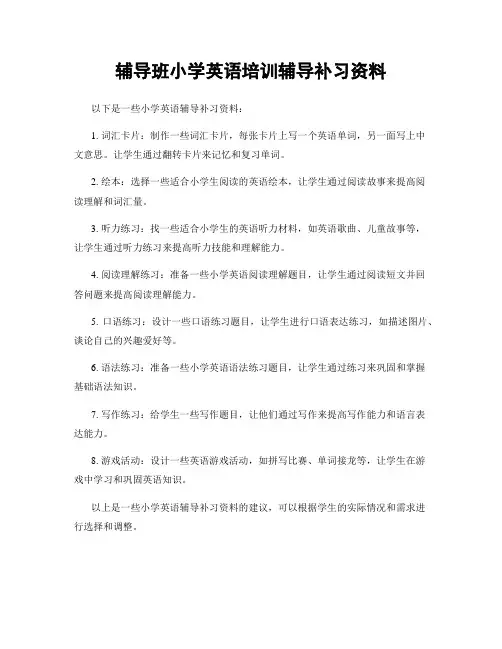
辅导班小学英语培训辅导补习资料以下是一些小学英语辅导补习资料:
1. 词汇卡片:制作一些词汇卡片,每张卡片上写一个英语单词,另一面写上中
文意思。
让学生通过翻转卡片来记忆和复习单词。
2. 绘本:选择一些适合小学生阅读的英语绘本,让学生通过阅读故事来提高阅
读理解和词汇量。
3. 听力练习:找一些适合小学生的英语听力材料,如英语歌曲、儿童故事等,
让学生通过听力练习来提高听力技能和理解能力。
4. 阅读理解练习:准备一些小学英语阅读理解题目,让学生通过阅读短文并回
答问题来提高阅读理解能力。
5. 口语练习:设计一些口语练习题目,让学生进行口语表达练习,如描述图片、谈论自己的兴趣爱好等。
6. 语法练习:准备一些小学英语语法练习题目,让学生通过练习来巩固和掌握
基础语法知识。
7. 写作练习:给学生一些写作题目,让他们通过写作来提高写作能力和语言表
达能力。
8. 游戏活动:设计一些英语游戏活动,如拼写比赛、单词接龙等,让学生在游
戏中学习和巩固英语知识。
以上是一些小学英语辅导补习资料的建议,可以根据学生的实际情况和需求进
行选择和调整。

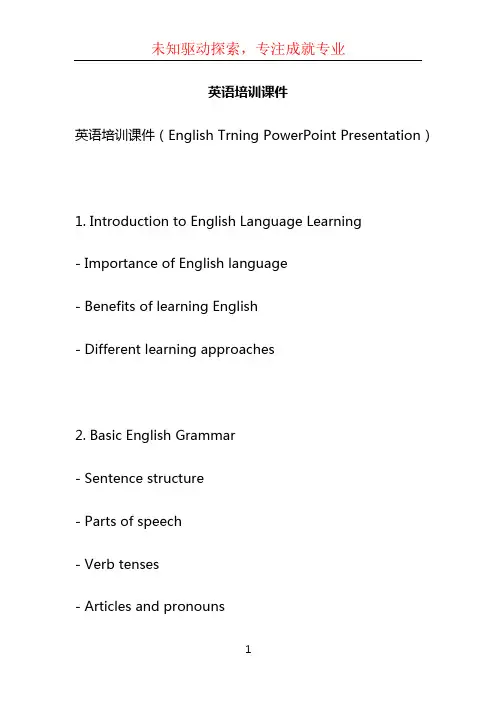
英语培训课件英语培训课件(English Trning PowerPoint Presentation)1. Introduction to English Language Learning- Importance of English language- Benefits of learning English- Different learning approaches2. Basic English Grammar- Sentence structure- Parts of speech- Verb tenses- Articles and pronouns3. Vocabulary Building- Word formation- Synonyms and antonyms- Idioms and expressions- Prefixes and suffixes4. Reading Comprehension- Strategies for improving reading skills - Understanding mn ideas and detls- Text analysis and interpretation5. Listening and Speaking Skills- Listening comprehension exercises- Speaking practice and role plays- Pronunciation and intonation6. Writing Skills- Essay writing techniques- Formal and informal writing styles- Grammar and sentence structure in writing7. Test Preparation- Tips for TOEFL/IELTS exams- Practice exercises and mock tests- Time management strategies8. Cultural Awareness- Understanding different English-speaking cultures- Cultural norms and etiquette- Cross-cultural communication skills9. Business English- Vocabulary and phrases for business communication- Writing professional emls and letters- Presentation skills for meetings and conferences10. Interactive Activities and Games- Group discussion and debates- Vocabulary games and quizzes- Role plays and skits以上是一个典型的英语培训课件的内容大纲,可以根据具体培训需求进行调整和修改。
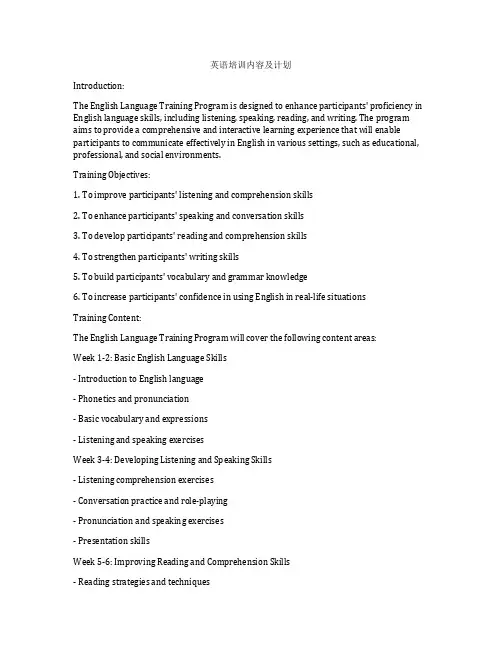
英语培训内容及计划Introduction:The English Language Training Program is designed to enhance participants' proficiency in English language skills, including listening, speaking, reading, and writing. The program aims to provide a comprehensive and interactive learning experience that will enable participants to communicate effectively in English in various settings, such as educational, professional, and social environments.Training Objectives:1. To improve participants' listening and comprehension skills2. To enhance participants' speaking and conversation skills3. To develop participants' reading and comprehension skills4. To strengthen participants' writing skills5. To build participants' vocabulary and grammar knowledge6. To increase participants' confidence in using English in real-life situationsTraining Content:The English Language Training Program will cover the following content areas:Week 1-2: Basic English Language Skills- Introduction to English language- Phonetics and pronunciation- Basic vocabulary and expressions- Listening and speaking exercisesWeek 3-4: Developing Listening and Speaking Skills- Listening comprehension exercises- Conversation practice and role-playing- Pronunciation and speaking exercises- Presentation skillsWeek 5-6: Improving Reading and Comprehension Skills- Reading strategies and techniques- Reading comprehension exercises- Vocabulary building and word recognition- Reading and discussing newspapers, articles, and storiesWeek 7-8: Enhancing Writing Skills- Basic writing skills and structure- Writing exercises and practice- Grammar and punctuation rules- Creative writing and essay writingWeek 9-10: Fluency and Confidence in English- Speaking fluently and confidently- Debates and discussions on various topics- Group presentations and public speaking- Mock interviews and real-life scenariosTraining Methods:The English Language Training Program will utilize a variety of teaching methods and tools to ensure a dynamic and engaging learning experience:- Interactive lectures and presentations- Group discussions and activities- Role-playing and simulations- Listening to audio recordings and watching videos- Writing and editing exercises- Peer feedback and evaluations- Practical assignments and projects- Guest speakers and language immersion activitiesTraining Materials:Participants will be provided with the following training materials and resources:- Textbooks and workbooks- Online learning platforms and resources- Audio and video materials- Reading materials such as articles and stories- Writing tools and reference materials- Vocabulary and grammar resources- Assessment and evaluation toolsAssessment and Evaluation:Throughout the program, participants will be assessed and evaluated based on their progress, participation, and performance in various learning activities. The assessment will include the following components:- Quizzes and written tests- Speaking and presentation assessments- Reading comprehension tests- Writing assignments and projects- Participation in group discussions and activitiesTraining Schedule:The English Language Training Program will be conducted over a period of 10 weeks, with a total of 40 training sessions. Each training session will be 2 hours long, and will be scheduled on weekdays, either in the morning or evening, to accommodate participants' availability.Weeks 1-2:- Monday and Wednesday: 9:00 am - 11:00 am- Tuesday and Thursday: 6:00 pm - 8:00 pmWeeks 3-4:- Monday and Wednesday: 9:00 am - 11:00 am- Tuesday and Thursday: 6:00 pm - 8:00 pmWeeks 5-6:- Monday and Wednesday: 9:00 am - 11:00 am- Tuesday and Thursday: 6:00 pm - 8:00 pmWeeks 7-8:- Monday and Wednesday: 9:00 am - 11:00 am- Tuesday and Thursday: 6:00 pm - 8:00 pmWeeks 9-10:- Monday and Wednesday: 9:00 am - 11:00 am- Tuesday and Thursday: 6:00 pm - 8:00 pmTraining Plan:The English Language Training Program will be implemented according to the following plan:Week 1-2:- Introduction to English language and basic vocabulary- Phonetics and pronunciation exercises- Listening comprehension activities- Role-playing and conversation practiceWeek 3-4:- Developing conversation and presentation skills- Reading and discussing newspapers and articles- Building vocabulary and word recognition- Pronunciation and speaking exercisesWeek 5-6:- Reading strategies and techniques- Reading comprehension exercises- Writing skills and structure- Grammar and punctuation rulesWeek 7-8:- Speaking fluently and confidently- Group presentations and public speaking- Mock interviews and real-life scenarios- Writing exercises and practiceWeek 9-10:- Debates and discussions on various topics- Peer feedback and evaluations- Final assessment and evaluation- Certificate of completion ceremonyConclusion:The English Language Training Program will provide participants with the knowledge, skills, and confidence to communicate effectively in English language. The program's comprehensive content, interactive methods, and practical resources will ensure that participants achieve their learning objectives and become proficient English language users.。
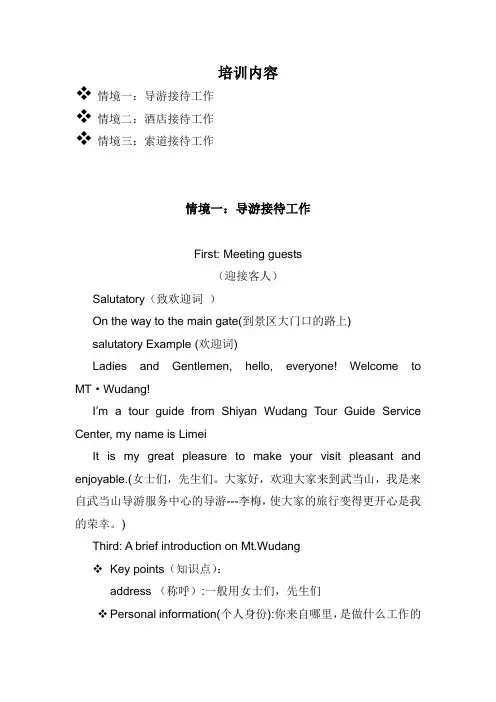
培训内容情境一:导游接待工作情境二:酒店接待工作情境三:索道接待工作情境一:导游接待工作First: Meeting guests(迎接客人)Salutatory(致欢迎词)On the way to the main gate(到景区大门口的路上)salutatory Example (欢迎词)Ladies and Gentlemen, hello, everyone! Welcome to MT·Wudang!I‟m a tour guide from Shiyan Wudang Tour Guide Service Center, my name is LimeiIt is my great pleasure to make your visit pleasant and enjoyable.(女士们,先生们。
大家好,欢迎大家来到武当山,我是来自武当山导游服务中心的导游---李梅,使大家的旅行变得更开心是我的荣幸。
)Third: A brief introduction on Mt.WudangKey points(知识点):address (称呼):一般用女士们,先生们Personal information(个人身份):你来自哪里,是做什么工作的Express thanks(表达感谢):感谢游客来武当山旅游。
Second: Waiting for bus(等候景区旅游巴士)ExampleFor environment protection of Mt·Wudang, every tourists need to take a Sightseeing bus, which discharged gas is more clear compare with a common bus. (为了保护武当山的环境,所有的游客来到这里都必须乘坐景区观光巴士。
相对于普通巴士来说,它排出的废气更干净。
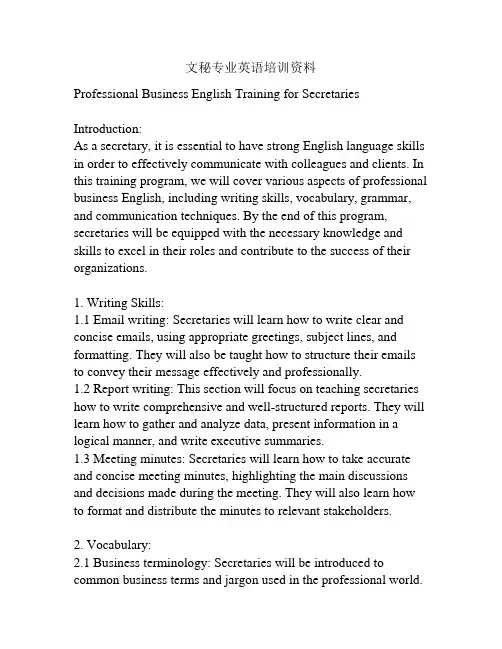
文秘专业英语培训资料Professional Business English Training for Secretaries Introduction:As a secretary, it is essential to have strong English language skills in order to effectively communicate with colleagues and clients. In this training program, we will cover various aspects of professional business English, including writing skills, vocabulary, grammar, and communication techniques. By the end of this program, secretaries will be equipped with the necessary knowledge and skills to excel in their roles and contribute to the success of their organizations.1. Writing Skills:1.1 Email writing: Secretaries will learn how to write clear and concise emails, using appropriate greetings, subject lines, and formatting. They will also be taught how to structure their emails to convey their message effectively and professionally.1.2 Report writing: This section will focus on teaching secretaries how to write comprehensive and well-structured reports. They will learn how to gather and analyze data, present information in a logical manner, and write executive summaries.1.3 Meeting minutes: Secretaries will learn how to take accurate and concise meeting minutes, highlighting the main discussions and decisions made during the meeting. They will also learn how to format and distribute the minutes to relevant stakeholders.2. Vocabulary:2.1 Business terminology: Secretaries will be introduced to common business terms and jargon used in the professional world.They will learn how to use these terms appropriately in their oral and written communication.2.2 Industry-specific vocabulary: Depending on the industry they work in, secretaries will learn industry-specific vocabulary relevant to their organization. This will enable them to better understand and communicate with colleagues and clients.3. Grammar:3.1 Review of grammar rules: Secretaries will review essential grammar rules, such as tenses, articles, and sentence structure. Emphasis will be placed on common mistakes and how to avoid them.3.2 Sentence construction: This section will focus on teaching secretaries how to construct clear and grammatically correct sentences. They will learn techniques to improve sentence flow and coherence.4. Communication Techniques:4.1 Active listening: Secretaries will learn how to actively listen to colleagues and clients, ensuring they fully understand their needs and requirements. They will also learn how to ask relevant questions to clarify any uncertainties.4.2 Telephone etiquette: This section will cover basic telephone etiquette, including proper greeting, tone of voice, and effective communication over the phone.4.3 Body language: Secretaries will learn how to understand and interpret body language, enabling them to better communicate and build rapport with colleagues and clients.Conclusion:By mastering the skills taught in this training program, secretaries will be able to communicate more effectively and professionally in both written and oral English situations. These skills will not only enhance their performance as secretaries but also contribute to the overall success of their organizations. It is recommended that secretaries regularly practice and reinforce these skills to ensure continuous improvement.5. Cultural Awareness:5.1 Cross-cultural communication: Secretaries will learn the importance of understanding different cultures and how it affects communication in a professional setting. They will be taught strategies to effectively communicate with colleagues and clients from diverse cultural backgrounds, such as adapting their communication style and being mindful of cultural differences in business practices.5.2 Business etiquette: This section will cover the proper etiquette in business settings, including greetings, introductions, and appropriate behaviors during business meetings and events. Secretaries will learn the cultural norms and expectations that should be adhered to in their organization and industry.6. Time Management:6.1 Prioritization: Secretaries will learn techniques to prioritize tasks effectively, ensuring they are completed in a timely manner. They will learn how to assess the urgency and importance of tasks and allocate their time accordingly.6.2 Organization skills: Secretaries will be taught methods to maintain an organized workspace and system for managing documents, emails, and appointments. This will help them stay ontop of their responsibilities and ensure they are able to access information quickly when needed.7. Professionalism and Integrity:7.1 Professional conduct: Secretaries will understand the importance of maintaining high standards of professionalism in their roles. They will learn about appropriate behaviors, dress codes, and ethics in the workplace.7.2 Confidentiality: Secretaries will be educated on the importance of maintaining confidentiality in their work, especially when handling sensitive information. They will learn protocols for handling confidential client and company information to ensure it remains secure.8. Problem-Solving and Decision Making:8.1 Analytical thinking: Secretaries will be trained to think critically and analyze situations and information to come up with effective solutions. They will learn how to identify problems, gather information, evaluate options, and make informed decisions.8.2 Proactive approach: Secretaries will learn to anticipate problems and take proactive measures to prevent or minimize them. They will also be taught problem-solving techniques to address issues that arise in a calm and efficient manner.9. Customer Service Skills:9.1 Interpersonal skills: Secretaries will learn how to effectively interact with clients and provide exceptional customer service. They will be taught techniques to build rapport, actively listen toclient needs, and handle difficult situations professionally.9.2 Clear and concise communication: Secretaries will learn how to communicate information clearly and concisely to clients, ensuring they understand the message and are satisfied with the service provided.10. Continuous Improvement:10.1 Self-assessment: Secretaries will learn the importance of self-assessment and reflective practice to identify areas for improvement. They will be encouraged to regularly reflect on their performance, seek feedback, and take steps to enhance their skills and knowledge.10.2 Professional development opportunities: Secretaries will be informed of professional development opportunities, such as workshops, conferences, and online courses, to further enhance their skills in business English and related areas. They will be encouraged to take advantage of these opportunities to continuously update their knowledge and stay current with industry trends.Conclusion:This comprehensive training program equips secretaries with the essential skills and knowledge to excel in their roles as effective communicators and contributors to their organizations. By consistently practicing and reinforcing these skills, secretaries will not only enhance their own professional growth but also contribute to the success and productivity of their organizations. Continuousimprovement and proactive learning are key to staying relevant and successful in today's dynamic business environment.。
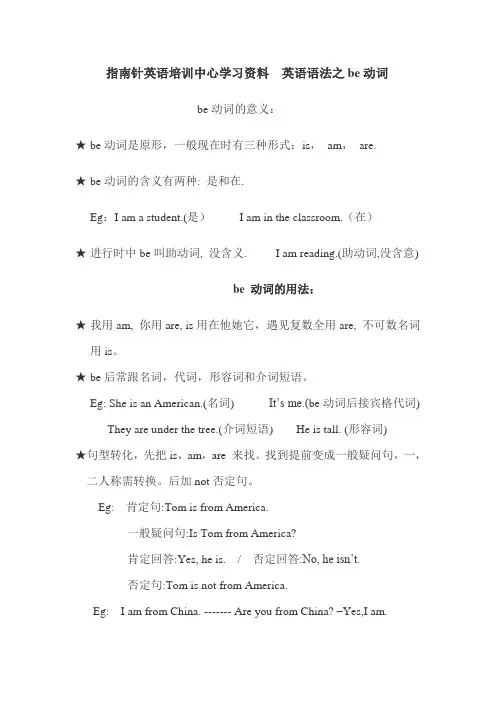
指南针英语培训中心学习资料英语语法之be动词be动词的意义:★be动词是原形,一般现在时有三种形式:is,am,are.★be动词的含义有两种: 是和在.Eg:I am a student.(是)I am in the classroom.(在)★进行时中be叫助动词, 没含义. I am reading.(助动词,没含意)be 动词的用法:★我用am, 你用are, is用在他她它,遇见复数全用are, 不可数名词用is。
★be后常跟名词,代词,形容词和介词短语。
Eg: She is an American.(名词) It’s me.(be动词后接宾格代词) They are under the tree.(介词短语) He is tall. (形容词)★句型转化,先把is,am,are 来找。
找到提前变成一般疑问句,一,二人称需转换。
后加not否定句。
Eg: 肯定句:Tom is from America.一般疑问句:Is Tom from America?肯定回答:Yes, he is. / 否定回答:No, he isn’t.否定句:Tom is not from America.Eg: I am from China. ------- Are you from China? –Yes,I am.用恰当的be动词填空。
(is, am, are)一1.I ______ a girl.2.My name _______ Mary.3.I ______ in Class 2, Grade 7.4.I ______ 12 years old.5.Here ______ my family photo.6.Look! These ______ my parents and those _______ mygrandparents.7.This boy ______ my brother.8.He ________ 15 years old now.9.That ______ my cat,Mimi.10.It ______ very lovely.二11. I ________from Australia.12. She _______ a student.13. Jane and Tom _________my friends.14. My parents _______very busy every day.15. I _______ at school.16. He ________ at school.17. We ________ students.18. They ________ from China.19. Yang Ling ________ eleven years old.20. Where ________ your friends?21. How old __________ you last year?22. Which dog ________ yours?23. Ten and two ________ twelve.三24. I ______ a boy. ______ you a boy? No, I _____ not.25. The girl______ Jack's sister.26. The dog _______ tall and fat.27. The man with big eyes _______ a teacher.28.. Mike and Liu Tao ______ at school.29. That ______ my red skirt.30..The jeans ______ on the desk. .31. The black gloves ______ for Su Yang.32. This pair of gloves ______ for Yang Ling.33. The two cups of milk _____ for me.34. Some tea ______ in the glass.35. Gao shan's shirt _______ over there.36. My sister's name ______Nancy.37. This ______ not Wang Fang's pencil38. You, he and I ______ from China.四39. Here ______ a scarf for you.40. Here ______ some sweaters for you.41. There ______ a girl in the room.42. There ______ some apples on the tree.43. There _______ some bread on the plate.44. There _______ a boy, two girls, three men and ten women in the park.五:45. ______ your brother in the classroom?46. ______ David and Helen from England?47. _______ there any kites in the classroom?48. _______ there any apple juice in the bottle?六:49.Where ________ your friends?50. How old __________ you last year?51. Which dog ________ yours?52.Where _____ your mother? She ______ at home.53. How _______ your father?54. Whose dress ______ this?55. Whose socks ______ they?56. Who ______ I?根据要求转换句型:57. She is a lovely girl. (变为否定句)58..They are Chinese.(同上)59.They are in the same class.(变成一般疑问句,并进行肯定和否定回答)60.Tim is an American boy.(变成一般疑问句, 并进行肯定和否定回答)61.Ketty and Mary are friends.(变成一般疑问句,并进行肯定和否定回答)62.We are in the supermarket.(同上)63.You are from Japan.(同上)64.I am Alice.(同上)65.Tim is from France.(变为否定句)。
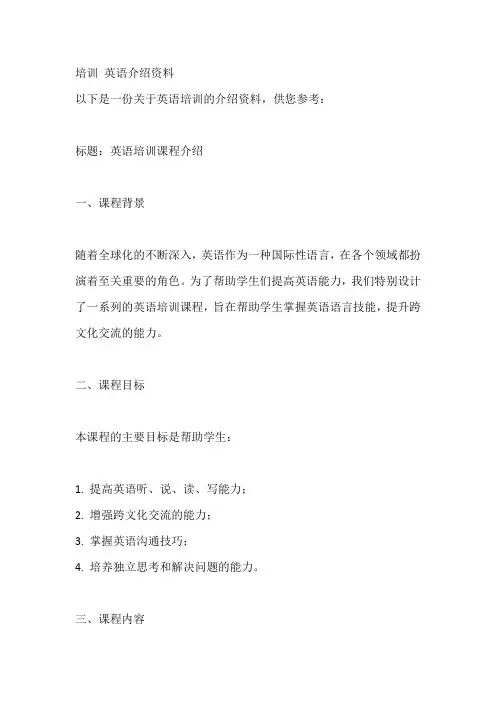
培训英语介绍资料以下是一份关于英语培训的介绍资料,供您参考:标题:英语培训课程介绍一、课程背景随着全球化的不断深入,英语作为一种国际性语言,在各个领域都扮演着至关重要的角色。
为了帮助学生们提高英语能力,我们特别设计了一系列的英语培训课程,旨在帮助学生掌握英语语言技能,提升跨文化交流的能力。
二、课程目标本课程的主要目标是帮助学生:1. 提高英语听、说、读、写能力;2. 增强跨文化交流的能力;3. 掌握英语沟通技巧;4. 培养独立思考和解决问题的能力。
三、课程内容本英语培训课程分为以下几个模块:1. 听力训练:通过多样化的听力材料,如新闻、电影、讲座等,训练学生的听力技巧,提高其理解能力。
2. 口语表达:通过角色扮演、讨论、演讲等活动,培养学生的口语表达能力,并帮助其熟悉不同场合的用语。
3. 阅读理解:通过阅读英文文章,提高学生的阅读能力和阅读速度,同时增强其理解和分析能力。
4. 写作技巧:通过写作练习和范文分析,提高学生的写作技巧,包括语法、词汇、段落组织等。
5. 跨文化交流:通过对比分析中西文化差异,培养学生的跨文化交流能力,包括礼仪、习俗、价值观等方面。
6. 沟通技巧:通过模拟真实场景,教授学生沟通技巧,如有效倾听、提问技巧、情感管理等。
7. 独立思考与解决问题:通过问题解决和批判性思维练习,培养学生独立思考和解决问题的能力。
四、教学方法本课程采用以下教学方法:1. 互动教学:通过互动活动,鼓励学生积极参与,锻炼其口语表达和听力理解能力。
2. 个性化指导:针对学生的不同需求和能力水平,提供个性化的指导和建议。
3. 小组合作:通过小组合作,培养学生的团队协作能力,同时增强其跨文化交流能力。
4. 案例分析:通过真实案例的分析和讨论,帮助学生将理论知识应用于实际情境。
5. 技术支持:利用现代教学技术,如在线学习平台、多媒体资源等,提高教学效果和学生学习效率。
五、课程安排与评估本英语培训课程分为10个阶段,每阶段持续4周。
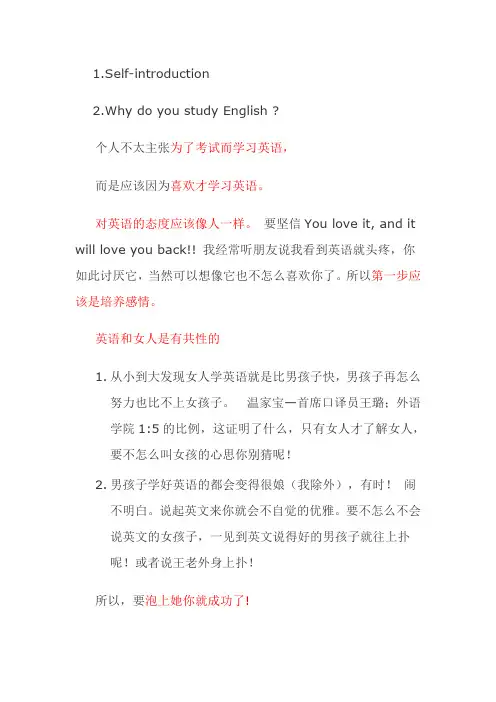
1.Self-introduction2.Why do you study English ?个人不太主张为了考试而学习英语,而是应该因为喜欢才学习英语。
对英语的态度应该像人一样。
要坚信You love it, and it will love you back!! 我经常听朋友说我看到英语就头疼,你如此讨厌它,当然可以想像它也不怎么喜欢你了。
所以第一步应该是培养感情。
英语和女人是有共性的1.从小到大发现女人学英语就是比男孩子快,男孩子再怎么努力也比不上女孩子。
温家宝—首席口译员王璐;外语学院1:5的比例,这证明了什么,只有女人才了解女人,要不怎么叫女孩的心思你别猜呢!2.男孩子学好英语的都会变得很娘(我除外),有时!闹不明白。
说起英文来你就会不自觉的优雅。
要不怎么不会说英文的女孩子,一见到英文说得好的男孩子就往上扑呢!或者说王老外身上扑!所以,要泡上她你就成功了!问题:怎么追女孩儿的?哈巴狗(百依百顺)—狼狗(咬别的狗)-- 看门狗(爱家)女孩子--交女生朋友一样就好了培养感情需要时间,那么你每天花在英语这个女人上的时间就一定要多,刚开始她肯定反感你,你也不了解她,慢慢的培养感情,朋友,十分钟,十五分钟,小小的改变,了解,不讨厌,不反感,那你就进步多了。
感情培养起来—习惯---从中获得乐趣---到这一步感情就出来了---从被迫学习变成主动学习了。
很多事情归根到底到是态度问题,我觉得只有心态正了,让她成为你的兴趣而不要只是为了考试,整天想着为了考试你是没办法学好的,只要这样才能学得开心,无忧无虑间自己没发觉,别人已经意识到你踏出一大步了。
3.Read the text4.vocabularyL1-4 GRAMMAR1.THERE BE 结构表示“在什么地方或时间存在什么事物”there 本身没有意义。
There are two children in the rooma)There is /was+单数名词+表示场所的介词短语There is a smile on her face.There was a puppy in my familyb)There are/ were + 复数名词+ 表示场所的介词短语There are some apples in the basket.There were some books on the desk just nowThere 与have的区别都表示“有”。
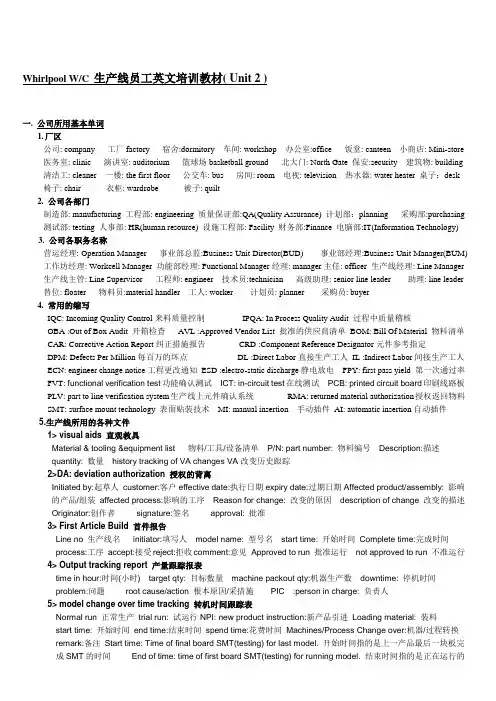
Whirlpool W/C 生产线员工英文培训教材( Unit 2 )一. 公司所用基本单词1.厂区公司: company 工厂factory 宿舍:dormitory 车间: workshop 办公室:office 饭堂: canteen 小商店: Mini-store 医务室: clinic 演讲室: auditorium 篮球场basketball ground 北大门: North Gate 保安:security 建筑物: building 清洁工: cleaner 一楼: the first floor 公交车: bus 房间: room 电视: television 热水器: water heater 桌子:desk 椅子: chair 衣柜: wardrobe 被子: quilt2. 公司各部门制造部: manufacturing 工程部: engineering 质量保证部:QA(Quality Assurance) 计划部:planning 采购部:purchasing 测试部: testing 人事部: HR(human resource) 设施工程部: Facility 财务部:Finance 电脑部:IT(Information Technology)3. 公司各职务名称营运经理: Operation Manager 事业部总监:Business Unit Director(BUD) 事业部经理:Business Unit Manager(BUM) 工作坊经理: Workcell Manager 功能部经理: Functional Manager经理: manager主任: officer 生产线经理: Line Manager 生产线主管: Line Supervisor 工程师: engineer 技术员:technician 高级助理: senior line leader 助理: line leader 替位: floater 物料员:material handler 工人: worker 计划员: planner 采购员: buyer4. 常用的缩写IQC: Incoming Quality Control来料质量控制IPQA: In Process Quality Audit 过程中质量稽核OBA :Out of Box Audit 开箱检查AVL :Approved Vendor List 批准的供应商清单BOM: Bill Of Material 物料清单CAR: Corrective Action Report纠正措施报告CRD :Component Reference Designator元件参考指定DPM: Defects Per Million每百万的坏点DL :Direct Labor直接生产工人IL :Indirect Labor间接生产工人ECN: engineer change notice工程更改通知ESD :electro-static discharge静电放电FPY: first pass yield 第一次通过率FVT: functional verification test功能确认测试ICT: in-circuit test在线测试PCB: printed circuit board印刷线路板PLV: part to line verification system生产线上元件确认系统RMA: returned material authorization授权返回物料SMT: surface mount technology 表面贴装技术MI: manual insertion 手动插件AI: automatic insertion自动插件5.生产线所用的各种文件1> visual aids 直观教具Material & tooling &equipment list 物料/工具/设备清单P/N: part number: 物料编号Description:描述quantity: 数量history tracking of VA changes VA改变历史跟踪2>DA: deviation authorization 授权的背离Initiated by:起草人customer:客户effective date:执行日期expiry date:过期日期Affected product/assembly: 影响的产品/组装affected process:影响的工序Reason for change: 改变的原因description of change 改变的描述Originator:创作者signature:签名approval: 批准3> First Article Build 首件报告Line no 生产线名initiator:填写人model name: 型号名start time: 开始时间Complete time:完成时间process:工序accept:接受reject:拒收comment:意见Approved to run 批准运行not approved to run 不准运行4> Output tracking report 产量跟踪报表time in hour:时间(小时) target qty: 目标数量machine packout qty:机器生产数downtime: 停机时间problem:问题root cause/action 根本原因/采措施PIC :person in charge: 负责人5> model change over time tracking 转机时间跟踪表Normal run 正常生产trial run: 试运行NPI: new product instruction:新产品引进Loading material: 装料start time: 开始时间end time:结束时间spend time:花费时间Machines/Process Change over:机器/过程转换remark:备注Start time: Time of final board SMT(testing) for last model. 开始时间指的是上一产品最后一块板完成SMT的时间End of time: time of first board SMT(testing) for running model. 结束时间指的是正在运行的产品第一块板完成SMT的时间Model change over time:(max of processes’ change over time) 转拉时间指的是在转拉过程中最长工序所花费的时间二.口语训练Nice to Meet You很高兴认识你听下列对话,练习自读跟读。
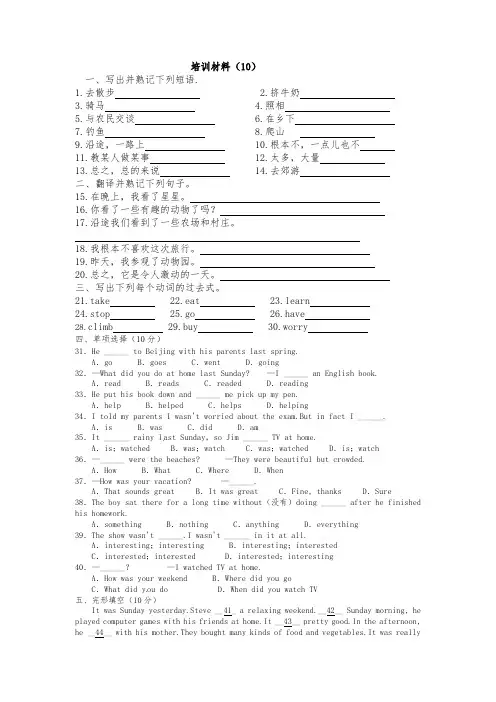
培训材料(10)一、写出并熟记下列短语.1.去散步2.挤牛奶3.骑马4.照相5.与农民交谈6.在乡下7.钓鱼8.爬山9.沿途,一路上10.根本不,一点儿也不11.教某人做某事12.太多,大量13.总之,总的来说14.去郊游二、翻译并熟记下列句子。
15.在晚上,我看了星星。
16.你看了一些有趣的动物了吗?17.沿途我们看到了一些农场和村庄。
18.我根本不喜欢这次旅行。
19.昨天,我参观了动物园。
20.总之,它是令人激动的一天。
三、写出下列每个动词的过去式。
21.take 22.eat 23.learn24.stop 25.go 26.have28.climb 29.buy 30.worry四、单项选择(10分)31.He ______ to Beijing with his parents last spring.A.go B.goes C.went D.going32.—What did you do at home last Sunday? —I ______ an English book.A.read B.reads C.readed D.reading33.He put his book down and ______ me pick up my pen.A.help B.helped C.helps D.helping34.I told my parents I wasn't worried about the exam.But in fact I ______.A.is B.was C.did D.am35.It ______ rainy l ast Sunday,so Jim ______ TV at home.A.is;watched B.was;watch C.was;watched D.is;watch 36.—______ were the beaches? —They were beautiful but crowded.A.How B.What C.Where D.When37.—How was your vacation? —______.A.That sounds great B.It was great C.Fine, thanks D.Sure 38.The boy sat there for a long time without(没有)doing ______ after he finished his homework.A.something B.nothing C.anything D.everything39.The show wasn't ______.I wasn't ______ in it at all.A.interesting;interesting B.interesting;interestedC.interested;interested D.interested;interesting40.—______?—I watched TV at home.A.How was your weekend B.Where did you goC.What did y ou do D.When did you watch TV五、完形填空(10分)It was Sunday yesterday.Steve __41_ a relaxing weekend.__42__ Sunday morning, he played computer games with his friends at home.It __43__ pretty good.In the afternoon, he __44__ with his mother.They bought many kinds of food and vegetables.It was really relaxing and exciting.In the evening, he __45__ a talk show with his parents and lis tened to some songs by a __46__ singer.__47__ Ann had a busy weekend.She __48__ stopped working.On Sunday morning, she cleaned her bedroom and did her homework.In the afternoon, she went to visit her uncle and __49__ him do some farm work.In the evening, she cooked dinner for her parents.After dinner, she washed the dishes.Then she went out __50__ a walk with her dog.What about your weekend?41.A.has B.have C.had D.was42.A.In B.At C.For D.On43.A.be B.is C.was D.were44.A.goes shopping B.went shopping C.went to shopping D.went shops 45.A.watched B.watches C.looked D.see46.A.height B.medium C.popular D.long47.A.But B.Because C.Or D.So48.A.often B.always C.usually D.never49.A.helped B.liked C.asked D.told50.A.at B.for C.from D.onⅥ.阅读理解(30分)AKim went to a beautiful beach on Monday with his friends.It was sunny and hot.So they had great fun playing in th e water.In the afternoon,they went shopping.But the shops were crowded(拥挤),they didn't really enjoy it.The next day,it was rainy,so they went to a museum.It was boring.Kim found a small boy crying in the corner.The boy was lost.He helped the boy find his father.Kim was very happy.But he had no money for a taxi.So he had to walk back to the hotel.That made him very tired.On Wednesday,the weather was very cool.So they played tennis.They played all the morning.It was really fun.根据短文内容,判断句子正(T)误(F)。
RESTAURANT一.Welcome The Guest1.Welcome to our hotel, sir, Anything I can do for you?先生, 欢迎您来我们酒店. 我能为您做点什么吗?2.This way , please?这边请。
3.Welcome, sir. Step right in, please.欢迎光临,先生. 请进.4.Welcome back, Nice to meeting you again.欢迎您再来,很高兴又见到您.5.Good morning. How many persons of you, please?早上好,请问几位?6.Have you made/got a reservation, sir先生,您有预订座位吗?8.In whose name was the reservation made?请问是谁预订的餐位?9.Oh, Mr Smith. We’ve been/ We are expecting you.噢,史密斯先生,我们正等候着您呢?10.Where would you prefer to sit?您喜欢坐哪儿?11.What about that table near the window?靠窗边的位置怎么样?12.Is this table fine with you, madam?这张桌子可以吗, 夫人?13.I’m afraid all the private rooms are reserved. Would you mind sitting in the main dining rooms?恐怕所有的厅房都预订完了,您介意在主餐厅用餐吗?14.I’m s o glad you like it.很高兴您喜欢这儿.15.Here is the menu, please take your time. The waiter will be with you in a moment.这是菜单, 请享用您们的时光,服务员马上就来.二.Taking Orders16.What kind of drink would you like?您要喝什么饮料?17.Would you like to start with a glass of beer?您想先要一杯啤酒吗?18.May I take your order, madam?请问您要吃点什么,夫人?19.Are you ready to order now?您准备点菜了吗?20.Have you decided on something, sir?先生,您决定点什么菜吗?21.What are you going to have / take today?先生,您要吃点什么?22.What kind of dishes do you want?您要什么菜?23.What dishes do you particularly like?您特别喜欢吃什么菜?24.Would you like to order a set course or a la carte?您想叫一份套餐还是按菜单点菜?25.What sort of appetizer would you like?您想来点什么开胃品?26.Would you like some hors d`oeuvres?您是否要来点餐前小吃?27.Would you like to have something to start with before your main course?上主菜前您要来点什么吗?28.What sort of side dish would you like?您想要点什么配菜?29.Would kind of beverage do you like to go with your meal??您想要您的菜配什么酒?30.What kind of vegetable would you like to have?您想吃点什么蔬菜?31.What kind of soup do you like to have before the main course?您吃主菜前要喝点什么样的汤?32.How many portions?要几份?33.What would you like to follow?您下一道菜点什么?34.If you order a set dinner, you get your choice of soup or juice, one entrée with potato, vegetable, salad, bread, butter and sometimes coffeeand even dessert for a set price.如果您吃套菜, 您可以在规定的价格内选择某些食品, 汤或果汁, 一份主菜配土豆,沙拉, 黄油面包,有时还有咖啡,甚至甜点.35.What would you prefer, coffee or tea?您想要喝点什么, 咖啡还是茶?36.Is there anything else you would like to have? /Is there anything that you want?还有别的您想要吗?37.Roast Duck. There will be a slight delay for that.烤鸭, 那会稍微慢一点.38.Pizza will take about ten minutes to prepare. Would you mind waiting?比萨大概要10分钟才能做好, 您愿意等吗?39.Your order will be ready in a few minutes.您点的菜一会儿就来.40.The dish you ordered is come immediately.您点的菜马上就来.41.The T-bone steak is very good, I would suggest that you try it.T 型骨牛排很不错的.我建议您们试试这道菜.42.Can I recommend the Grand Marnia, sir. It’s very popular.先生,我推荐金万利,这种酒很受欢迎.43.We have a very nice vegetable today. Wine flavored bamboo shoots, it’s our chef’s recommendation. It’s delicious and worth a try.我们今天的蔬菜不错, 酒醉冬笋是我们主厨的拿手菜, 它的味道好值得一尝.44.Chinese food is divided into eight big cuisines, such as Cantonese food, Sichuan food, Fujian food, etc. Our restaurant is famous for itsCantonese style.中国菜可分为八大菜系, 有粤, 川, 闽等等. 我们餐厅以粤味风格的菜而闻名.45.What about the eggplant and min ced pork in dry red chilisauce ? It’s our special course.鱼香茄子怎么样? 它们是我们的特色菜.46.May I serve soup to you now?我现在可以上汤吗?47.Shall I put the fish in the middle of the table?我把鱼放在桌子中央好吗?48.Your eggs will be ready in a few minutes.您点的鸡蛋马上就来.49.The food is best while eaten hot. Please enjoy your meal.这道菜趁热吃最好,请慢慢享受.50.Take your time and enjoy it.请慢享受.51.Hope you’ll enjoy your dinner.希望您用餐愉快.52.Wish you a good appetite祝您用餐愉快。
2021级英语科优生培训资料(五)第一部分阅读理解ARecently a growing number of foreign universities, such as the University of Cambridge, are accepting China's gaokao results as one of their admission standards. Is the Chinese college entrance exam being recognized globally? Forum readers share their opinions:Cecilia Zhang(China)The gaokao is a really tough exam. If possible, it can be used as one of the indicators(指标)for foreign universities, in addition to other indicators, such as how well they speak the target language. The students, who perform well in the gaokao, also have the ability to successfully adapt to Western styles of education. I believe accepting the gaokao as an indicator is a win-win for Chinese students and overseas universities.Wchao37(US)In fact, gaokao is perhaps much more difficult than the SAT or ACT exams. You can get a perfect score of 1,600 on the SAT but not in the gaokao, partly because the SAT is a machine-scored multiple-choice exam. Do you know anyone that has ever achieved a perfect score in the gaokao?Harry01(UK)Hundreds of students from China have entered universities in the UK using their gaokao scores, which requires that their knowledge of English be above a certain level. This measure has benefited specific groups of students from various backgrounds in China.Mbursian(Canada)In order to attend a university in an English speaking country, a student needs to have an acceptable band score on the IELTS. Most importantly, students need an acceptable knowledge of the language spoken in any country they plan to study in. Now the Chinese gaokao is closer to meeting the requirements of different countries.1. Who believes accepting the Chinese gaokao is a win-win?A. Cecilia Zhang.B.Wchao37.C.Harry01.D.Mbursian.2. What is most important for Chinese students planning to study abroad according to Mbursian?A. The IELTS score.B. Enough test preparation.C. The Chinese gaokao score.D.Knowledge of the native language.3.What does the text intend to tell the readers?A. The gaokao will replace other tests.B. The gaokao is becoming globally accepted.C. The gaokao is the most difficult of all tests.D. The University of Cambridge made a good decision.BJeremy Locke,who owns a roofing and construction company in Glace Bay,Nova Scotia, had always been wanting to repair the roof of Jeanette MacDonald's home. Whenever he drove past the woman's home, he assumed that the roof was under repair because the job had already been taken on by another group of repairmen-but as the weeks wore on,the roof continued to worsen without any signs of repair.“I had it in my mind that if no one steps up to help this lady in our community, I'd be more than happy to,” Locke told CBC.When Locke finally reached out to MacDonald about fixing her roof for free, however, she politely declined his offer because she did not like to accept charity. That being said, she had already applied for a government grant(补助金)to fix the roof and she said she was more than happy to hire Locke once her grant application was approved. Unfortunately, MacDonald never received the approval.As the stubborn(固执的)Canadian senior refused to accept any assistance from Locke, the sympathetic construction worker played an innocent trick in order to get her to accept his help. He invited MacDonald to enter a raffle(抽奖活动)that his business was holding for a free roof. After the grandmother-of-four accepted one of the raffle tickets, Locke told her that she was the winner-because she was the only one who had entered the raffle.Thanks to his sweet little plan, Locke and his crew are starting work on the roof this week, which is expected to cost his company about $9,000. MacDonald, meanwhile,told CBC that she doesn't know how to express her gratitude to Locke, saying that he is her “guardian angel”。
一、Numerals(数字(shùzì))(一)基数词1、第一类:zero 0 one 1 two 2 three 3 four 4 five 5 six 6 seven 7 eight 8 nine 9 ten 10 eleven 11 twelve 122、第二类:thirteen 13 fourteen 14 fifteen 15 sixteen 16 seventeen 17 eighteen 18 nineteen 193、第三类:twenty 20 thirty 30 forty 40 fifty 50 sixty 60 seventy 70 eighty 80 ninety 904、第四类:twenty-one 21forty-six 46seventy-eight 78ninety-five 955、第五类:100 one hundred101 one hundred and one156 one hundred and fifty-six192 one hundred and ninety-two200 two hundred6、第六类:1,000 one thousand1,001 one thousand and one1,300 thirteen hundred;one thousand and three hundred2,034 two thousand and thirty-four6,502 six thousand five hundred and two(二)序数词下面(xià mian)把1-99的序数词也分为四个类。
1、第一类first (1st) 第一(dìyī) second (2nd) 第二(dìèr) third (3rd) 第三(在括号(kuòhào)里的是缩写形式,均在阿拉伯数字后面加上相应序数词的最后两个字母构成,以下各类与此相同。
保安部英语培训资料Part1:欢迎问候语1.Good morning. 早上好。
Good afternoon. 下午好。
Good evening. 晚上好。
2.Hello. 你好。
3.Welcome. 欢迎。
4.How are you today? 你今天好吗?-I'm fine .Thank you.And you? 我很好,谢谢。
你呢?Part2:征询用语1.May I help you? 我能帮你什么吗?2.Wait a moment,please. 请稍等一下。
Part3:答谢与应答答谢:Thank you. 谢谢。
应答:My pleasure. 很高兴为您服务。
Part:4:致歉用语1.Excuse me. 打扰一下!2.I am sorry. 我感到很抱歉!3.That' OK. 没关系。
听不清楚时:1.Pardon,please? 没听清?2.Sorry,I don't know. 对不起,我没听清楚。
3.Wait a moment , please . 请稍等一下。
Part5:指路与引路1. Follow me ,please! 请跟我来!2. This way,please . 请走这边。
3.Sorry, I don't know. Please go to the front desk.对不起,我不知道。
请到前台咨询。
Part6:提示用语1.No smoking here,please。
请不要在这里吸烟。
2.No parking here,please. 请不要在这里吸烟。
3.After you. 您先请。
Part7:告别欢送语1.Goodbye!再见。
2. See you! 再见!3. Good day! 祝您过得愉快!附注:数字:1 :one 2:two 3: three 4:four 5:five 6: six 7: seven 8: eight 9: nine 10 : ten。
酒店英语培训资料酒店英语培训资料(一)1、礼貌地与客人打招呼及称呼客人,表示你对他们的热情欢迎:—“早上好,小姐/先生。
”“Goodmorning,madam/sir.”—“下午好,小姐/先生。
”“Goodafternoon,madam/sir.”—“晚上好,小姐/先生。
”“Goodevening,madam/sir.”﹡客人喜爱听你称呼他的姓氏,因此尽可能常用,如:“王先生,陈小姐,李太太”等。
—“专门快乐再次见到您(欢迎再次光临),王先生。
”“Nicetosee/meetyouagain,Mr.Wang.”或与客人互相寒暄:—“您今天好吗?”“Howareyou(today)?”—“我专门好,感谢,你呢?”“I’mfine,thankyou,andyou?”—“专门好,感谢您?”“I’mverywell,/I’mfine,too.Thankyou.”酒店英语培训资料:※UsefulWordsandExpressions:1)Sir2)Madam3)Miss4)Ms5)meet6)Goodmorning/afternoon/evening!7)Glad/Niceto…8)Howdoyoudo?/Howareyou?酒店英语培训资料(二)2、主动向客人提供关心:—“我能够帮您吗?”“MayIhelpyou?”/WhatcanIdoforyou?”﹡尽量为客人多做一点:—“还有什么需要我帮您吗?”“IsthereanythingelseIcandoforyou?”※UsefulWordsandExpressions:1)May/CanI…?2)Ifyouneedmyhelp,justcallmeplease.3、记住一些能讨人喜爱的言词:—“感谢。
”“Thankyou.”—“别客气。
”“Youarewelcome.”—“对不起。
”“I’msorry.”—“没关系。
”“That’sallright.”—“请。
1. 幕墙国际会议自我介绍:名字:My english name is andrew.公司:I am representing JiangHe curtain wall company.职责(主要负责事物):I am in charge of structural calculation/design&fabrication drawing/tender drawing.2. 我是刚毕业的学生:I am a fresh graduate.3. 幕墙中常用的变形:deflection, 而不是deformation.Deflection: the degree to which the moving part on a measuring instrument moves away from zero.Deformation: the progress of changing the shape of something in a way that spoil its usefulness or appearance.D.L dead load 永久荷载4. 常用的荷载缩写W.L wind load 风荷载L.L live load 活荷载5.表面处理可分为两种:(1).(2).Natural AnodiseBlack Anodise 镀黑色Bronze AnodiseHot dipped galvanize 热镀stick curtain wall system 框架式幕墙6.Electrical galvanize 电镀unitised curtain wall system 单元式幕墙Tower 主楼分格division 方管square section7.Podium 群楼格栅lattice 圆管round pipePrimary gasket 第一胶条primary bracket steel primary bracket8. gasket 转角连接tSecondary gasket 第二胶条secondary bracket secondary U-shape bracket10.双面贴 double side tape1. system美纹纸(玻璃) masking tape fixed glass 保护膜(型材) protection film 2. openable window (固定窗) 中横梁 Mid transom 介绍图纸spandrel area中立柱 Mid mulliondummy 3. capping (背板区域) 剖面 sectionBack-pannel平面 plan (背板)立面 elevation 4. glass ( the glass is ….. glass) 插芯 mullion sleeve11.本体绿玻璃Green tinted glassD.G .U ( double glazed unit)中空玻璃 insulated glassDouble glass夹胶玻璃 Laminated glass浮法玻璃 float glass= anneal glass 钢化玻璃 tempered glass半钢化玻璃 half strengthened glass 低辐射镀膜玻璃 玻璃 镀膜玻璃 Low-E coated glass (coated glass) 热反射镀膜玻璃 Heat reflecting glass Ceramic-fritted glass彩釉玻璃 frit pattern glassSilk screen glass中空夹胶玻璃 Laminated double glass彩釉夹胶玻璃 laminated glass with ceramic frit 钢化中空透明玻璃Tempered insulated clear glass 12.Bolt & Nut 螺栓群Csk self-drilling screw 沉头自攻螺钉 Self-taping screw machine screw Self-drilling screw 自攻自钻螺钉 机丝螺钉 自攻螺钉13.14.铝吊顶 Alum ceiling铝单板 aluminium solid pannel 铝片 Aluminium sheet复合铝板 composite aluminium panel蜂窝铝板 Aluminium honey-comb panel 穿孔铝板 Aluminium perforated panel 铝合金百叶 Aluminium louver铝 铝合金门窗 Aluminium door&window铝框 Aluminium frame铝合金横梁公料 male stack extrusion铝合金横梁母料 female stack extrusion 铝合金立柱公料 male mullion extrusion 铝合金立柱母料 female mullion extrusion 铝合金转角立柱 Aluminium corner mullion 开启框 openable frame 开启扇 openable sash15.总包:main contractor 组织结构图organization chart分包:sub-contractor 总计划(总包发给分包) Master programme顾问:consultant 施工进度计划图project scheduleArchitectural drawingSctructural drawing 结构图总包给的东西Wind tunnel test report 风洞试验报告Specification 技术说明B.O.Q Bill of quantity 清单System design 方案设计Concept design 初步设计分包需要做的Shop drawing 施工图设计fabrication drawing 加工图设计Calculation book 计算书As-built drawing 竣工图16.Boundary line 红线(建筑)weekly meeting 例会Landscape 景观设计co-ordination meeting 协调会Guard house 保安室safety meeting 安全会议Curved glass 弧形玻璃Method statement 施工组织计划书Club house 会所(休息)Technical brochure 技术手册Pergola 凉亭operation manual 操作手册Fabrication factory 加工厂overhead crane 龙门吊Warehouse 仓库hoisting platform 吊车平台Pagoda 塔Glass block 玻璃砖(透明)17. Discrepancy 矛盾,不同(图纸和技术文件不同时)a difference between two amounts, details,reports etc that ought to be the same.1. How do you explain these discrepancies in the amounts2. There are big discrepancies between what the marget says and what you say. Deviation 偏离,偏差a noticeable differnece from what is expected or acceptable* deviation from the norm18. Vibration 幕墙的颤动(由于风的原因)Buckling 弯曲(自重引起)Deflection 变形,挠曲Slot / elongated 长条孔Round hole 圆孔19.Wind tunnel test 风洞试验Performance testCompatibility test 相容试验Pull- out test 拉拔试验Fild water testImpact/ point load testFilm thickness testPaint hardness testStructural sealant test 结构胶试验Sound proof test 防声试验Fire proof test 防火试验20. window sill capping 窗台板Canopy 雨篷Gypsum Board 石膏板Skyight 采光顶Cement board 水泥板sun shade 遮阳板Calcium silicate board 硅酸钙板Trellis 花架Partition wall 隔板(酒店办公室等用)sill height 窗台高Curtain box 窗帘盒lightening protcter 避雷器Horizontal rail 防护栏(窗子处防冲击用)lightening tape 避雷带External corner 阳角Anti- rust primer 防锈漆Internal corner 阴角gondola 擦窗机Flashing 收口BMU=building maintance unitJoint splice 积水槽擦窗机设备Joint sleeve 插芯Alimark hoist=HoistingliftExpansion / movement joint 伸缩缝升降机Backer rod泡沫棒Scaffolding / staging 脚手架Granite 花岗岩Marble 大理石21.Silicone gun 胶枪Air gun 气枪Screw driver 螺丝刀Hand-drill 手电钻Spanner 扳手Hammer 锤子Measuring/Measurment tape 卷尺Scale ruler 比率尺Callipers卡尺Visual mock-up 视觉模型Test/ performance mock-up 测试模型22.outter frame (框) Sash (开启)Top HungSide HungDown Hung(上悬窗) Casement window (下悬窗)(平开窗) sliding window 滑动窗fixed glass 固定窗Horizontal Pivoted Vertical Pivoted (水平旋转窗)(垂直旋转窗) 23.23. Friction stay 铰链 Master key 万能钥匙Butterfly Hinge 合页 Top view 上视图Sliding track 滑动轨道 Left View 左视图 Roller 滑轮 Right view 右视图 Lever handle 条形把手 Render picture 效果图 Cylinder handle 圆形把手Removable handle 可移动把手 Panic Hardware 护栏(逃生时用) 24.Reinforcement bar 钢筋 F.F.L finished floor level Grid line 轴线F.L floor levelCorrugated sheet 压型板S.L structural finish level Steel truss 钢桁架S.F.L structural finish level25.(底面) 26.Starter bar 外露钢筋(混凝土浇注时,在层间留设的钢筋) Recess pocket 凹陷部位(在预埋件处的楼层凹陷的地方) Raised floor 架空地板(用于铺设电线,网线而架设的地板)27. circulation the momvement of liquid, air etc in a system Air circulation 空气内部的流通,不是室内和室外的空气交换。
问候与接待:)晚上好!下午好!(早上好!你好! ) !(Good morning/afternoon/evening!Hello我能帮你什么忙吗? What can I do for you?/May I help you?您能重复一遍吗? I beg your pardon?可以请您慢一点吗?Would you please slow down? 请稍等一下。
Please wait a minute/second/moment. 感谢与应答:非常感谢。
Thank you very much.谢谢您的合作。
Thanks for your cooperation!不客气。
You are welcome!/It’s my pleasure!/ Don’t mention it!道歉与应答:I’m sorry对不起!!对不起,让您久等了。
Sorry to keep you waiting. 很抱歉打扰您。
Sorry to trouble you.很抱歉,这是规定。
I’m terribly sorry, but this is the rule.Never mind./没关系。
It doesn’t matter.告别:再见! /See you later! !Goodbye祝您旅途愉快! Have a nice trip!欢迎下次再来中国。
Welcome to China again.Communication(1 ) 1 对话机场职员S: Staff 旅客P: Passenger您能告诉我餐厅在哪吗? P: Could you tell me where the restaurant is located?] down to Basement Level One and it’s right əS: Certainly. Take the elevator ['eliveitthere.可以,乘电梯到地下一层就是。
P: Where are the elevators? 电梯在哪里?自动扶梯在那 ] over there. əleitəS: The elevators are beside the escalators['esk边,电梯在自动扶梯旁边。
知道了。
非常感谢。
P: Got it. Thank you very much.不客气。
S: You are welcome.对话 Communication(2) 2P: Excuse me. Do you know where I can find something to read?麻烦您了,请问您知道哪里可以买到读物?a beside bookstore a see will you and ahead corner second the at left Turn S:restaurant.在前面第二个拐角左转,你会看到在餐厅旁边有一家书店。
P: OK. Thanks. 好的。
谢谢。
不客气。
S: My pleasure.3 对话 Communication(3)您好,小姐。
: Excuse me, Miss? P有什么需要帮忙的吗? S: Yes, sir. Anything I can do for you?这边有吸烟 P: Do you have smoking roomhere?/Where can I have a cigarette?我可以在哪里吸烟?/室吗?S: The smoking room is located on the first floor. Please go straight ahead and takethe escalator on your left to go downstairs.吸烟室在一楼,您由此直走并搭乘左边扶手电梯下楼好的,我知道了。
P: OK. I see.S: Please pay attention to the announcement for your boarding to make sure not to请注意收听有关您航班的广播,以确保您不会误机。
miss your flight.谢谢您的温馨提示,我 P: Thank you very much for your kindly reminder. I will!会的。
乐意效劳。
S: Happy to serve you.复习Overview机场职员S: Staff 旅客P: PassengerGood Morning/Afternoon/Evening. Welcome to our Capital Jet Terminal. :P欢迎光临首都公务机。
! 晚上好/下午/早上请问是出港航班吗?S: Is it the departure flight?不是,是进港航班。
No, it’s the arrival flight. :PS: Can I have your place of departure and estimated time of arrival?可以告诉我航班的出发地和预落时间吗?Yes, it leaves Shanghai for Beijing, and the estimated time of arrival is 4:20pm.:P4:20航班从上海出发,预计下午到达北京。
the at2:00pm,and Shanghai from departing A, is number flight Your right. All S:estimated time of arrival is 4:20pm.,预计预达时间为下2:00,出发地上海,起飞时间为下午A 好的,您的航班是。
4:20午:P to change the time of using the room. My flight has been changed ,and I want我变更了航班,想把休息室的使用时间做一下调整。
S: Please tell me the new flight number and the time you expect.请你告诉我变更后的航班号码,及你想调整的使用时间。
(一)机场常用句型您的目的地是哪里?your destination? is What请您告诉我您的航班号。
Please tell me your flight number.will We 如果有变化我们会change. any there is in time , if you inform及时通知您。
请问您想喝点什么?you like to drink? would What 请小心地滑。
floor is slippery. step. The your Mind 不好意思,我恐怕没办法那样做。
can not do that. afraid I am I对不起请再说一遍好吗?pardon? your beg I、对话模式2怎么走?……请问Excuse me, where is the …? A:请您直行右转。
Go along this way then turn right. B: 非常感谢!Thank you very much!:A不客气。
You are welcome. B:、情景练习词汇3bathroom washroom : 卫生间/洗手间room; dining 餐厅: toilet restroom第四次课怎样开始谈话 How to open the conversation询问行程您在中国呆多长时间呢? How long will you stay in China?这次来中国会多呆一阵子吗? Will you stay in China longer this time? 变式:您想到哪些地方去玩呢? Where do you want togo/visit in China?情景设定这次会在中国多待一阵吗? A: Can you stay in China longer?B: Yeah, I will stay for three months this 是呀,这次我会待三个月。
time.您想去那里玩呢? A: Where do you want to go? 。
我们想去。
B: We are going to see…… 。
我推荐您去。
A: I recommend you to go to… in Beijing (名胜古迹)interest Places ofthe Imperial Palace 故宫the Forbidden City 紫禁城the Temple of Heaven 天坛故宫博物馆the Great Wall 长城Summer Palace 颐和园the Palace Museumthe Great Wall 长城the Summer Palace 颐和园Nest Bird's the 鸟巢the Water Cube 水立方句型年的历史……有have a history of about……years 朝……建于It was built in …… dynasty保存完好It is well-preserved.之一……它是最有名的It is one of the most famous places to visit…….它被看作是It is recognized as ___________皇宫imperial palace 景点scenic spot景点tourist attractions 皇imperial garden家园林为皇帝建的陵墓the emperor after his death 而建……它是为It was build for …为皇帝避暑the emperor to spend his summer days for defense purposethe emperor to amuse himself 为皇帝娱乐怎样结束谈话 How to end the conversation祝您今天Have a good day!祝您在中国玩得愉快!Wish you a happy stay in China!一切顺利!接听电话Beijing Capital International Airport, what can I do for you? this is ,Hello您好,这里是北京首都国际机场,你有什么事情?请稍候。
Please hold on for a moment/minute.cannot I Sorry, telephone and name your leave you can answer, the you givenumber if it is convenient.对不起,我们现在无法给您答复,如果方便的话请留下您的姓名和电话号码。